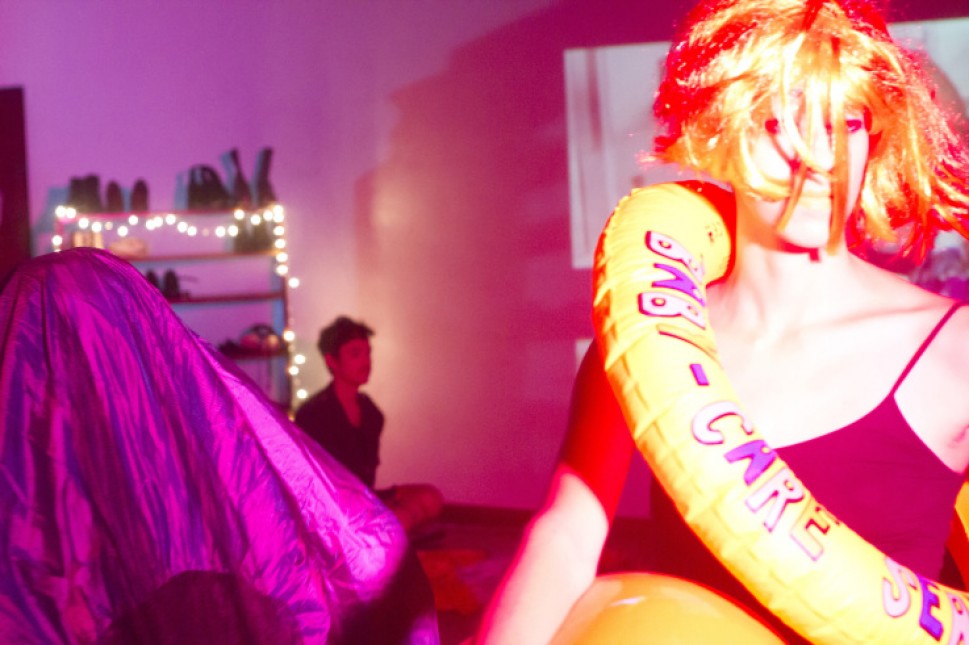 1. Can you tell us a little about your work, your history and your performative concerns.
1. Can you tell us a little about your work, your history and your performative concerns.
I’m Natasha, 20 years old. My first contact with the arts was when I was 3 years old, and I got into ballet classes. I danced for 12 years, and then I changed to the theatre´s universe. Nowadays, I’m about to graduate in Performing Arts at University of Brasília. At the University I got together with a group of friends who wanted to investigate performance, humor and post-dramatic theatre. There is an amazing director and artist Dra Simone Reis (doctor by the University of Melbourne, Australia), who introduced us to those languages, and who is one of our coordinators in this project of extension from the University: the LPTV – Laboratory of Performance and Theatre of Emptiness. The LPTV have being together for a year now and we keep researching those territories, doing some performances and giving some workshops. Therefore, we are still working just in Brasília, but we’re working in a lot of projects to send to festivals.
In my opinion, the performance is, first of all, about discovering yourself. It’s very personal; it’s about your point of view, your wishes, what disturbs you… The theatre can have some percentual of performance. It’s a big universe full of possibilities, based on a cross-border place and how you are going to compose with it depends of what you want to show/to talk about.
2. What are you working on now?
So, now a days, I’m working a lot with the LPTV’s first theatre-experiment: Con(fake)rência. We have been performing in some opportunities, but we still need to work on it. This working in progress experiment is based in our personal reports, memories and fantasies. We’re investigating the relations between real/fictional, performer/object, performer/video. We created it inspired in one of the La Pocha Nostra’s (USA/Mexico – pochanostra.com) exercises: The Performance Salon, which Guillermo Gómez-Peña described the aim of it, in his book about the Pocha’s methodologyEthno-tchno: writings on performance, activism and pedagogy, is ”to combine spectacle and process (…) is informal yet intensely focused – there is no backstage” (GÓMEZ-PEÑA, 2005: 133). There is some pictures and videos in my profile and also in the LPTV`s blog: www.lp-tv.blogspot.com. We really wish to go to Brazilian and international Festivals and others events. We`re working a lot on it!
Besides that, I have a new independent direction project on the University. I`m going to work with non-actors and also with personal reports. So, I’m always working with presence instead of representation. The non-actors don’t have their bodies and minds stocked in the conventional theatre, so it´s easier, in a way, but not less interesting to work with them. I would like to make the stage a funny place, but also a sensitive and honest space. It´s going to be a challenge for me.
3. What are your biggest performative obstacles for yourself in this new work?
Well, about LPTV´s work we have some difficulties especially with the resources. To research these contemporaries languages in Brazil is a bit hard. There are no research centers, moreover everything is new. We basically discover the things thorough the experimentations. There are few books translated, therefore I know that are pretty much materials about it around the world. So, I always keep an eye abroad, and with the internet we got everything. This network, for example, it´s fantastic! By the way I would like to enjoy the opportunity and ask for materials, I mean, if you have anything (videos, sites, books) related about one of those thing I just said, I would love to receive it. I also adore recommendations.
4. What was the last piece that you saw that you would recommend to the Network and why?
It was Mi Vida Después, by Lola Arias, an argentinean playwright and director. I already knew Lola’s work thorough internet (lolaarias.com.ar), but I have the pleasure to saw it last month in Buenos Aires. The play is really great because the actors talks about their parents’ life during the Argentinean military dictatorship. It´s the true history(ies) of a generation who lives with dudes about their past, but most of all it is about families, and let us thinking about our own relationships. I’m a super fan.
I would like to leave special acknowledges to everyone who votes on me on the poll!

